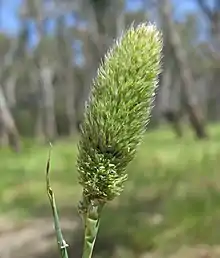Phalaris paradoxa
Phalaris paradoxa is a species of grass in genus Phalaris. Common names include awned canary-grass[1] and hood canarygrass.[2]
| Phalaris paradoxa | |
|---|---|
 | |
| Scientific classification | |
| Kingdom: | Plantae |
| Clade: | Tracheophytes |
| Clade: | Angiosperms |
| Clade: | Monocots |
| Clade: | Commelinids |
| Order: | Poales |
| Family: | Poaceae |
| Subfamily: | Pooideae |
| Genus: | Phalaris |
| Species: | P. paradoxa |
| Binomial name | |
| Phalaris paradoxa | |
The spikelets are very different from those of other members of this genus. The spikelet glumes each have a hook.
It is native to Africa, Asia, and Europe, and it has been introduced widely. Its distribution within the United States includes Arizona, California, Hawaii, Louisiana, Maryland, New Jersey, Oregon, Pennsylvania, Washington.
References
- BSBI List 2007 (xls). Botanical Society of Britain and Ireland. Archived from the original (xls) on 2015-06-26. Retrieved 2014-10-17.
- USDA, NRCS (n.d.). "Phalaris paradoxa". The PLANTS Database (plants.usda.gov). Greensboro, North Carolina: National Plant Data Team. Retrieved 24 September 2015.
External links
This article is issued from Wikipedia. The text is licensed under Creative Commons - Attribution - Sharealike. Additional terms may apply for the media files.